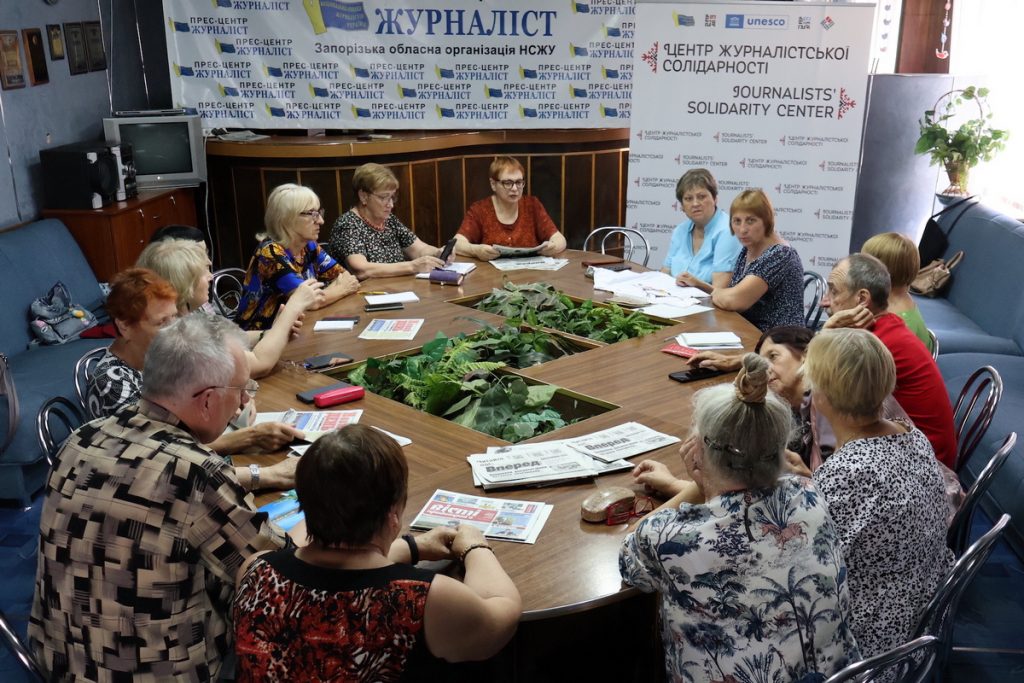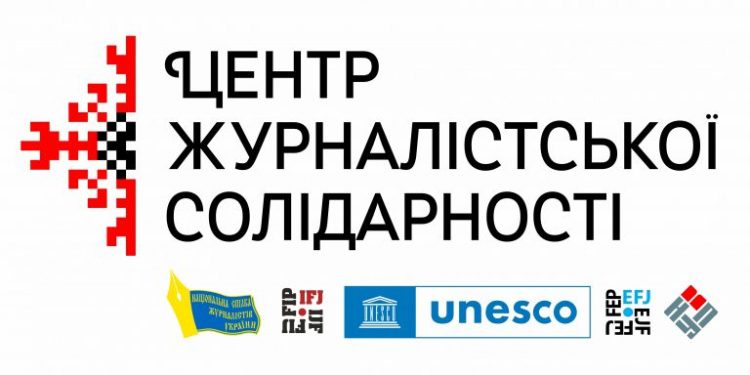The work of the network of Journalists’ Solidarity Centers (JSC) of the National Union of Journalists of Ukraine (NUJU) is aimed both at supporting Ukrainian media workers who were in trouble during the full-scale war and at restoring and increasing the resilience of Ukrainian media that suffered during the russian invasion.
The matter of how to strengthen coordination and cooperation was discussed during a specialized online coordination meeting held by the central office of the NUJU with representatives of journalistic hubs in the regions included in the sphere of responsibility of the Zaporizhzhia JSC of the NUJU. The meeting was attended by representatives of journalistic hubs and media of the “subordinate” regions – Mykolayiv and Zaporizhzhia.
This is the final meeting of a series of relevant meetings held with other NUJU JSCs together with the heads of regional Union organizations. The purpose of such events is to strengthen the JSC network’s partnership with regional organizations of the NUJU and leaders of leading media, as well as to determine, in view of the situation, the needs of journalistic communities and specific media workers in order to more effectively support journalists in need and their desire to remain in the profession.
The President of the NUJU, Sergiy Tomilenko, emphasized the possibilities of JSCs to help journalists. He noted that another goal of such online meetings is to work out the Action Plan and implement the priorities of the NUJU in 2024 so that the Union, as the largest journalistic association in the country, effectively assists Ukrainian journalists and is also able to recommend international partners and donors the ways to support journalists on the ground.
“Since the full-scale invasion, the NUJU has received a huge number of requests from journalists and has tried to be as efficient as possible in terms of assisting them. We are grateful to the international partners who extended a helping hand to us – the International and European Federation of Journalists, the UNESCO headquarters, and other partners. Currently, the JSC network is represented by the JSC office in Kyiv, which is located in the premises of the Union, as well as three regional JSCs that operate in three front-line cities – Zaporizhzhia, Dnipro, and Kharkiv, and two JSCs in Western Ukraine – in Ivano-Frankivsk and Lviv. However, the responsibilities of the entire network are to respond to requests from colleagues from all over Ukraine and to try to provide assistance. Of course, we would like to open such Centers in Odesa and Mykolayiv. However, we rely on the capabilities of international partners and donors, and their resources are currently limited. Therefore, we are strengthening the JSC network through better interaction with the regions,” Sergiy Tomilenko emphasized.
The President of the NUJU recalled that security issues are solved primarily through the JSC; in particular, the Centers have become a kind of free equipment rental points for bulletproof vests, helmets, and tactical first-aid kits, which journalists can take on business trips to dangerous zones. The JSCs also conduct constant training events dedicated to the use of first-aid kits, behaving in front-line areas, etc. Media workers who find themselves in trouble as a result of enemy attacks and emergencies can count on support from the emergency fund. In addition, all possible types of support – legal, psychological, training, provision of a workplace with the necessary equipment in JSC coworking spaces, assistance in providing accreditation of the Armed Forces of Ukraine (AFU) to journalists for the performance of professional duties are also available to media workers.
“Currently, one of our priorities is the revival of the media in the front-line and de-occupied territories, as well as strengthening the stability of the media, the stability of journalists in their profession, and the safety of journalists. We invite media people to apply for grants. All relevant information about this is available on the NUJU‘s website and our operational communication telegram channel https://t.me/spilkanews. Our key goal is that journalists do not leave the profession but remain in the profession so that the Ukrainian media has the stability to fulfill our important mission, which acquires special importance in times of war. That is why we are uniting partners around this,” Sergiy Tomilenko pointed out.
Co-coordinator of the Zaporizhzhia JSC / head of the Zaporizhzhia regional organization of the NUJU, Nataliya Kuzmenko, thanking the NUJU for its great work, noted that although the Zaporizhzhia JSC works according to the program approved for all Centers, it has its highlights.

“We have created a club of evacuated editors who came from the occupied territories. We helped them with clothing and humanitarian assistance and provided psychological and legal support… Today, this club of editors, formed of media representatives of the communities of all our occupied cities, has become a very strong team, which now has two relocated publications. One of them is the Trudova Slava newspaper from Orikhiv, which, since the start of the full-scale war, has already published 15 issues and has strong international support thanks to the NUJU. Now, the Holos Huliaipillia newspaper rests on its feet. Other publications have their websites, where they inform about life in their communities and beyond. In addition, there is a club in Zaporizhzhia called Vohnyk, where, in particular, specialists teach how to provide first aid. We have already held all-Ukrainian safety meetings for media workers there several times.”
Sergiy Tomilenko emphasized that over 30 newspapers from the occupied and front-line territories have already resumed their publishing with the support of the NUJU and international partners. And he expressed hope that after the liberation of the temporarily occupied territories, the initial restoration of local newspapers will continue.
According to the co-coordinator of Zaporizhzhia JSC, Valentyna Manzhura, two newspapers – Novomykolayivska and Vilnianska – have not stopped publishing in the region since the beginning of the full-scale war.
But in Odesa, as noted by the head of the NUJU regional organization, Yurii Rabotin, 19 newspapers are currently published. Young media replenishment is also growing. Students apply to the regional journalist hub, and after appropriate training, they are sent to practice in local media.
Currently, 15 out of 25 newspapers continue to be published in the Mykolayiv Region. As the head of the Mykolayiv regional organization of the NUJU, Mykola Stetsenko, said, few journalists left the region at the beginning of the full-scale invasion. But the routes of many media workers from other regions passed through Mykolayiv, and Mykolayiv colleagues helped them with evacuation.
The media also talked about those requests for help that are dictated by the times. In particular, most media are willing to participate in grant programs to strengthen their sustainability, but they lack knowledge. Viktoriya Veselovska, a media person and representative of the Mykolayiv Press Club, also spoke about this. She also spoke about other needs of local journalists – the need for technical means to stabilize the current voltage in newsrooms, the lack of equipment, including filming equipment, as well as the need for educational and training events.
The editor-in-chief of the Odesa newspaper Press-Kuriyer / honored journalist of Ukraine, Yosyp Burcho, drew attention to a problem that has been relevant for media workers since pre-war times – it is the work of those who depend on the printing of newspapers.
“Of all district newspapers in Odesa, only three are published in the regional center. The rest moved to the Vinnytsia printing house, and this happened because of the attitude of the Odesa printing house owners to their work. Somehow, Chornomoriya [printing house] delayed the publication of newspapers for a week. In general, there are many problems. But we need to keep newspapers on the media market, not to let them disappear,” Yosyp Burcho noted.
Viktoriya Mainych, the editor of the Novynar publication, recalled another problem common to all Ukrainian printed newspapers, noting that one of the reasons for the drop in circulation is the improper delivery of newspapers by the Ukrposhta state postal service.
“Ukrposhta has now sent the documents to include the publication in the catalog for the second half of the year, but I don’t even know if we will do it,” Viktoriya Mainych noted.
Meanwhile, the publication survives as best it can and tries to attract grants to increase its sustainability.
Viyacheslav Holovchenko, a well-known Mykolayiv media person, noted that it is worth paying attention to the personnel production of media men. According to him, new media are being launched in the south of Ukraine, but it happens that untrained media people come to work while many experienced journalists remain without work. So, it is also a kind of field for work.
In addition, the meeting also discussed the need for reputational expertise of the media.
“Zaporizhzhia Journalists’ Solidarity Center of the NUJU carries out titanic work,” noted the First Secretary of the NUJU and coordinator of the JSC network, Lina Kushch.
She drew the attention of the meeting participants to the fact that there should be an argumentative work on receiving assistance that the Centers can provide. In particular, it is worth preparing stories about damaged newsrooms and talking about injured journalists who need some help. After all, these are also additional arguments for international partners, whose support the NUJU hopes for.
“We should not expect help from the authorities, but donors want to see the transformation of Ukrainian media. Nowadays, compared to the beginning of the full-scale war, the grant system has changed, and now international partners can support only specific projects. If you have a vision of how to transform your newspaper, then you should participate in training and go ahead towards your goal. The Union is determined to help media that want to work and change,” Lina Kushch emphasized.
NUJU Information Service

 THE NATIONAL UNION OF
JOURNALISTS OF UKRAINE
THE NATIONAL UNION OF
JOURNALISTS OF UKRAINE
















Discussion about this post